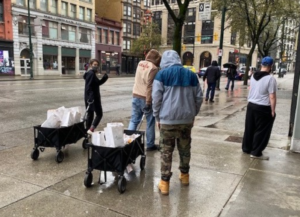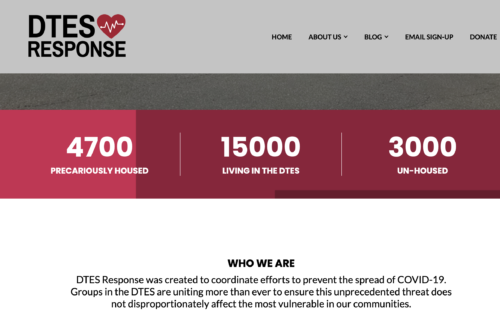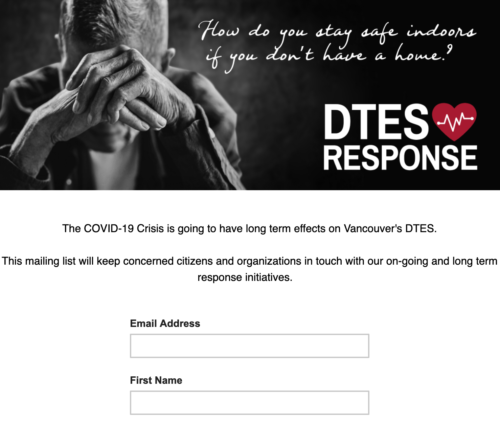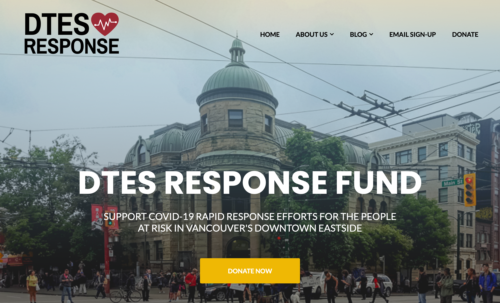
DTES Response team / Sarah Blyth supplied
The pandemic is giving rise to broader local initiatives.
Opinion: We have the ‘solution’ for Vancouver’s Downtown Eastside
By DTES Response Volunteers, March 30th, 2021
One year ago we launched DTES Response:
We created this initiative to coordinate efforts to prevent the spread of COVID-19 and help ensure this unprecedented threat did not disproportionately affect the most vulnerable in our communities.
When it became obvious that COVID-19 was a threat to the already vulnerable residents, frontline groups sprang into action.
Folks came together in ad hoc groups to figure out how to get massive quantities of hygiene products to community members.
This led to an ambitious campaign to get more support for other needs.
We launched with a goal to raise $100,000 for emergency relief.
Now, one year later, we have dispersed over $500,000 for coordinated projects and frontline groups.
As we reflect on this milestone, we think about the positive impact created through the coordination of so many grassroots initiatives and organizations that serve approximately 15,000 people at risk and 3,000 unhoused or precariously housed in the neighborhood.
Since our inception we have dispersed money to over thirty groups that serve unique needs to offer food and hygiene items, prevent overdoses, create low-barrier jobs, and provide information, mental health supports, and stipends for loss of income.
We have also been busy organizing and funding projects that provide things, like: food security, cell phones and plans, thousands of desperately needed gloves and masks and hand sanitizer to disperse.
We purchased over 100 Food Safe training spots for frontline workers, supported seven support hubs that sourced donated goods, contributed financially to hundreds of peer support jobs, and helped fund one of Canada’s first safe supply distribution machines.
These continue to be unsettling times, but we remain hopeful that by continuing to work together, we can do amazing things.
While we are optimistic that we will be able to put the pandemic behind us, it has further highlighted the inequities in our systems that we need to address.
We also know the neighbourhood is being described more frequently as a place of chaos and a waste of resources.
Readers take note: there are not enough resources, and the ones received are not wasted.
The fact that $500,000 could make such a huge impact on this community is evidence that resources are not wasted.
You only need to witness how a small amount of money can provide someone with shelter, a meal, and work that gives them the dignity so many of us take for granted.
There is one thing many of us agree on: the DTES deserves our attention.
And not only because it is part of Vancouver, but because the challenges facing this neighbourhood is the result of decades of urban development, social planning, and colonial mindset that have eroded the resilience and dignity of its residents.
As citizens of this city, we all have a responsibility.
Yet the solution will never be found in strangers that parachute into the neighbourhood with their prescriptive and well-meaning ideas.
The solution is found on the ground — with frontline groups, Indigenous voices, and community members with lived experience who have the insight and deep knowledge required to tackle these complex problems.
Those with proximity to the issues must be part of the conversation or there will never be an ethical or sustainable solution that many people in Vancouver want.
As we seek long-term solutions for the DTES, we are also starting to envision how DTES Response can continue to grow and coordinate projects that address inequities and the complex issues of poverty, homelessness, overdoses, food sovereignty, and social justice.
We see our ongoing role as a convener, coordinator, and capacity provider for frontline groups doing important work.
We are building a network working alongside other service providers to maximize and coordinate efforts, but this is not a one-size fits all approach.
Anyone who tells you the DTES should have one centralized coordinated structure doesn’t truly understand the interconnectedness of the issues that require a more nuanced approach.
We know that to solve the problems in the neighbourhood we need a variety of stakeholders at the table.
We just hope those on the frontlines who hold the knowledge and expertise are the ones hosting the dialogue and not brought in at the end as an afterthought, and that it is a compassionate and bottom-up approach to problem-solving.
DTES Response may have started out of a pandemic, but we will not stop advocating for the neighbourhood, and we certainly won’t stop until the other public health emergency — the drug poisoning crisis — ends.
We leave space here to reflect on the 1657 lives lost in Vancouver since the overdose crisis was declared a public health emergency in 2016.
DTES Response volunteers:
Amanda Burrows, Communications and Fundraising
Kathy Shimzu, Community Network Coordinator,
Elli Taylor, Frontline Community Consultant
Blog post, May 2020, DTES Response Fund:
Quarter Million Milestone & Call For Volunteers
Two months ago we launched DTES Response to ensure that COVID-19 did not disproportionately affect our most vulnerable.
As we reflect on all the community support over the last several weeks, we also want to communicate to you another milestone: we just hit one-quarter of a million dollars raised. That is $250,000 going directly to the frontlines doing the groundwork everyday! Wow.




